'We don't want another 30 years of dictatorship': First Nation unites to oust 'lifetime' chief

While Canada was celebrating National Indigenous Peoples Day last week, about 30 members of the Ojibway Nation of Saugeen met outside the locked gates of a half-built community centre to topple Chief Edward Machimity, who has gripped the reins of power in the small northern Ontario community for more than 30 years.
For the members who gathered last Friday, it was a pivotal moment in the short history of the band.
"We don't want another 30 years of dictatorship," said Desiree Jacko, 27, an on-reserve band member.
She is a registered early childhood educator, but says she can't get a job at the local school because of rampant nepotism in the community.
Around picnic tables outside the community centre, while the band's two-member police force watched from across the street, the members selected a new chief and four councillors — known as headmen — to lead the community for the first time in its history.
However, Machimity has refused to cede power. He and his inner circle issued a statement on June 23 claiming the "dissidents" elected themselves through an "unlawful" act.
The new chief and council responded with a statement through their lawyer, Rachael Paquette, saying the new political administration was chosen following the community's custom governance code.
'Lifetime chief'
Edward Machimity was first named chief when the band was created in 1985. Then, in 1997, when the band adopted its own custom governance code known as the "convention," he became chief potentially for life, subject only to a review of his leadership every 21 years.
Machimity and his immediate family control band services in the First Nation, which sits about 400 kilometres northwest of Thunder Bay and has an on-reserve population of about 84 people. They decide who gets a new house or renovations, who gets post-secondary education funding or who gets use of the medical van for appointments.
Many community members say Saugeen is controlled through fear, harassment and bullying.

While the First Nation is governed by the federal Indian Act, band members can't turn to Ottawa for help. Indigenous Services Canada typically doesn't intervene in internal governance disputes for bands that operate under custom governance codes, preferring to leave it to members to sort out their issues.
There are 358 First Nations under custom governance codes across the country. Most have some form of electoral system to choose their leaders, but a handful of bands follow a hereditary system.
With no help expected from Ottawa, band members decided to act to change their leadership last week at a traditional gathering called by Machimity.
The traditional gathering was first announced at the end of January. The notice was circulated on Facebook and taped up at the post office in nearby Savant Lake, where some band members live. The notice said the 21-year review of Machimity's leadership would be held under the custom code convention and be overseen by Anishinaabe monitors.
But Machimity inflamed tensions in May when he issued a letter to the community announcing that his wife, Violet Machimity, would replace him as chief upon his death. The letter also stated that his son-in-law, Darrell Keesic, would take on an unspecified leadership position with the band once he left his role as police chief.
Machimity, who is in his 70s, also suggested that he believed his own death was approaching and that he was preparing for the "next step" of his journey. He has diabetes-related ailments and has spent time in hospital in Sioux Lookout this year.
The chief set the agenda for the two-day gathering. Day 1 was to be an information gathering session where band members could express their concerns. The band leadership was scheduled to respond to those concerns on Day 2, but there would be no opportunity to discuss the leadership question.
The traditional gathering featured no feasts, ceremonies or social events.
'This is a police tactic'
As the 10 a.m. start time approached last Thursday, band members who started arriving encountered police Chief Darrell Keesic, dressed in civilian clothes and blocking the gate of the community's $4-million recreation centre, which is still under construction.
He demanded band members sign their names in a booklet of blank sheets before they entered the building. The band members were outraged and suspected it was a trick.
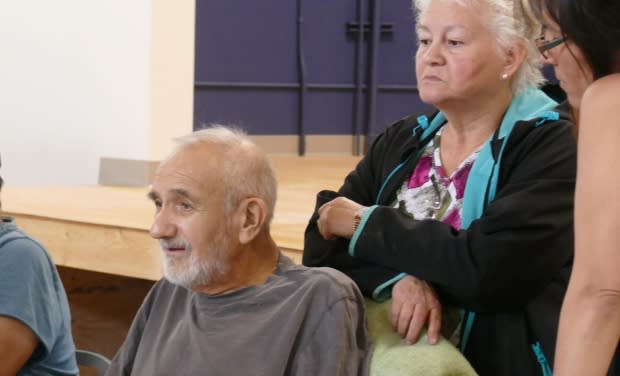
"It's a blank piece of paper. They could turn around and give it to the federal government and say everybody voted for them," said John Machimity, the chief's brother.
Paul Machimity, whose father was one of the founders of the band and an original headman, told the crowd that Keesic was trying to trigger a conflict.
"This is a police tactic," he said.
Two members of the Ontario Provincial Police's Aboriginal liaison unit showed up in plain clothes, along with a uniformed officer. The gate was eventually opened and band members were allowed to go into the meeting without signing their names.
The chief's side was outnumbered at the gathering. Of the roughly 40 people in attendance, about 30 of them wanted a change in their government. Only three people, Chief Machimity's son, Marvin, and his daughters, Norma and Rebecca, all adults, spoke directly in support of his leadership, according to video of the closed-door meeting that was shared with CBC News.
"I agree with the current leadership that is right in front of me. They've shown vision, they've shown respectability and honesty," Rebecca Machimity told the gathering.
"I will not follow any leadership that is full of hate, that uses threats and bullies."
The majority of speakers called for change or levelled various complaints and accusations against Chief Machimity, who sat in a wheelchair at the front of the room, his wife Violet to his right, John Sapay, a headman and his best friend, to his left. Eileen Keesic, another of the chief's daughters and a headman, sat next to Sapay.
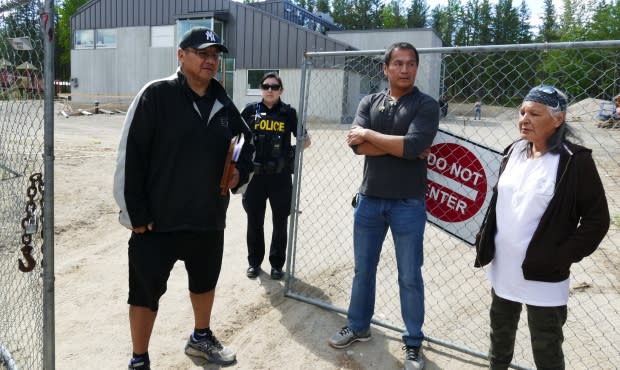
At one point, John Machimity asked people to raise their hand if they didn't want Violet Machimity to become the next chief, prompting most hands in the room to go up.
Chief Machimity spoke only twice during the meeting, at the beginning and the end.
"I am the lifetime chief and I am determined to stay until I pass on," he said in his opening statement.
In his closing statement, he thanked the members for showing up but reiterated he wasn't going anywhere.
"When we started this meeting, we made a statement that there is no election ... it's just a review," he said.
"I'm lifetime chief."
Then he quoted from the Bible, closed the meeting with a prayer and cancelled the planned second day of the gathering.
He declined an interview with CBC News before the meeting. Violet Machimity threatened to call security when approached for comment after the meeting.
Like Queen Elizabeth
Chief Machimity's son, Marvin Machimity, who is the band's cultural director, compared his father to Queen Elizabeth. Like with the British Royal Family, he said, power in Saugeen passes through blood and birth.
"It's hereditary," he said.
"Otherwise, they could throw out the Queen whenever they choose."
He said the "dissident" side has distorted the truth of the community.
"They have no vision, no insight, no foresight, no intelligence," he said.
"All this is fabricated stories… They don't work. They're mostly on welfare."
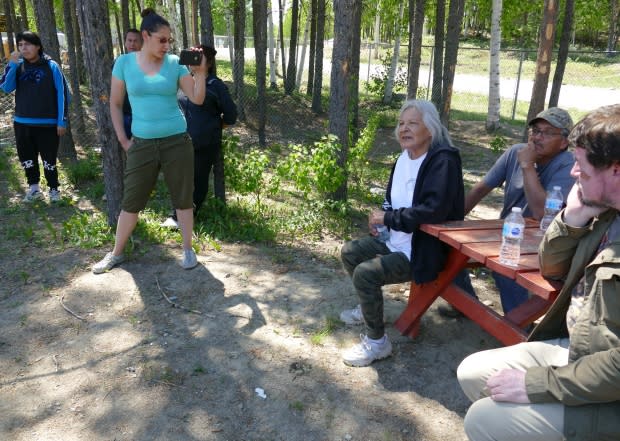
The next day, on June 21, which happened to be National Indigenous Peoples Day, about 30 people gathered again outside the gate to the community centre, which was locked this time.
The band members took turns signing documents printed with Ojibway Nation of Saugeen letterhead. Below a column titled "no," they signed to indicate they did not support Darrell Keesic's future appointment, the appointment of Violet Machimity as the next chief and the continuing rule of Chief Machimity.
Below the column titled "yes," they signed in favour of the appointment of four new headmen — Betty Necan, Darlene Necan, Joyce Medicine and Ron Machimity.
Ron Machimity was also unanimously chosen as chief after three other band members — Darlene Necan, John Machimity and Joyce Medicine — declined their nominations. Desiree Jacko was unanimously chosen to take Ron Machimity's place as headman.
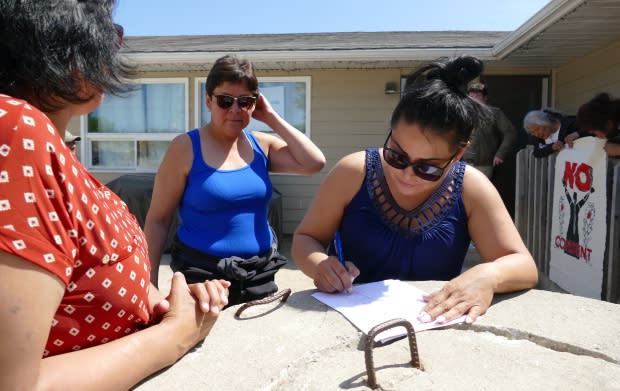
Ron Machimity's father, Gilbert Machimity, was one of the band's founders and original headmen. He died in 2000.
"Before he passed away he … told me if the old leadership didn't accept me as part of their government with his bloodline, he told me not to push the issue, that there would come a time when I would know when to step in and speak up," said Ron Machimity.
The chief-designate said he would be reaching out to Edward Machimity to discuss the transition in the coming days.
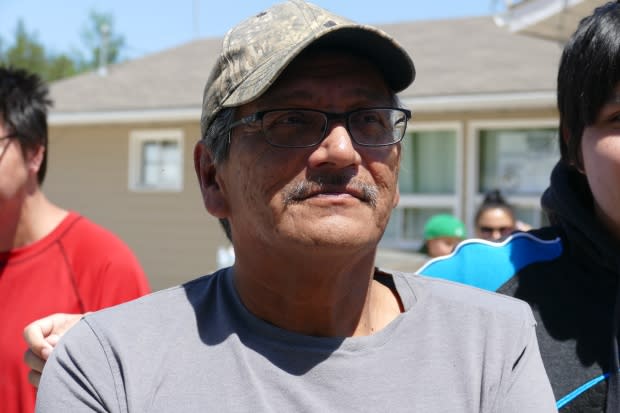
Betty Necan said she hoped this time Ottawa would recognize the change in government, which followed the custom governance code and was held on the second day of the planned traditional gathering.
"We'll see if they listen," she said.
She said she wants to work on changing the band's governance convention to get rid of the 21-year term.
A swearing-in ceremony for the new council is scheduled for July 6.


